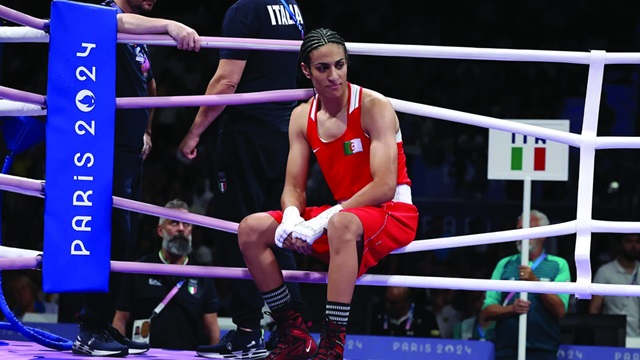By Aoife Coppinger 16 September 2024
Algerian boxer Imane Khelif went on to win gold at the Paris Olympics, despite the scrutiny and abuse she was subjected to by far-right and transphobic politicians, billionaires and news outlets. Khelif proves that cis women are also not safe from the policing of femininity typically aimed at transgender and intersex athletes.
In fact many cis women athletes, disproportionately black and brown women showing how much racism and misogyny intersect, have been subjected to gender testing and faced false accusations about their gender, from the Williams sisters to Caster Semenya and now most recently Khelif and Lin Yu Ting of Taiwan at the Paris Olympics.
Transphobic bigotry in sport – exclusion and discrimination are not okay
Sports has been a significant target of transphobes, with 25 US states now banning transgender students from playing on teams aligning with their gender identity. In Ireland, this has led to many sports organisations adopting cruel exclusionary policies that deny trans people the right to play. One such policy is that of Basketball Ireland, which not only requires that a player has legal recognition of their gender and to be undergoing hormonal therapy in a “verifiable manner”, but also shockingly that the individual has undergone “surgical anatomical changes, including external genitalia changes”. They add that any “transsexual… who underwent sex reassignment surgery before puberty will be approved”.
On top of the offensive language and intrusive gender policing contained in this, it’s laughable in a time when young trans people struggle to even acquire puberty blockers, and they have recently been outright banned in the UK and Northern Ireland. Puberty blockers are a life-saving form of trans healthcare, of which the effects are reversible if the individual chooses to stop taking them. No child is undergoing sex reassignment surgery, except when intersex children are forced without their consent into undergoing surgeries which push them into a box that societies’ strict gender binary deems suitable. This transgender ‘inclusion’ policy in fact excludes effectively all trans people, and provides a snapshot of what transgender people face when trying to participate in sports in Ireland.
Fuss and myths about hormones
Hormones are often central in the ‘debate’ about trans inclusion in sports, particularly testosterone and the perceived effect that it has on an individual’s strength. This idea came about in a time when scientists thought that only men produced testosterone, and women produced oestrogen. It is now known that people of all sexes have varying amounts of each hormone and individuals frequently fall outside what is ‘normal’, with one study showing that 16.5% of men exhibited ‘female’ levels of testosterone, and 13.7% of women had “male” levels. There are no studies that indicate that trans women’s testosterone levels, which vary significantly anyway, provide them with a sporting advantage.
These transphobic dogwhistles detract from genuine issues facing women’s sports – including sexual harassment and abuse; the gender pay gap; lack of adequate facilities, coaching, media coverage etc. Historically, many of the same organisations that now boast exclusionary policies for trans people while purporting to protect cis women athletes, are the very same organisations that battled hard for decades to keep women out of sport.
For example, the success of women’s football during and after World War I led to the FA banning women’s football in 1922, over their fear of the lack of control they held over the women’s game and the money it was generating. They perpetrated ideas about football being bad for women’s health to justify their decision. This ban lasted 51 years.
Rigid gender-binary is backward and sports should be for everyone
Sport helps physical and mental health and boosts self esteem, something that trans people, especially trans youth, are being denied across the globe. In a time when trans people are already more at risk of suffering from mental health issues, due largely to the onslaught of discrimination they face daily, access to inclusive sport could literally be life saving. The way society views sport needs to change. Fundamental to this is challenging the rigid gender-binary that sport upholds, and open up to the reality that intersex, trans and non-binary people exist and the strict male-female split is not fit for purpose.
Capitalism needs sexism and the gender-binary to function, profiting significantly from women’s and girl’s underpaid and unpaid labour. Therefore, to truly take on the sexist, racist and transphobic roots that exist in sport and fight for a future where everyone has the opportunity to participate in sport equally, the whole system must be challenged.

